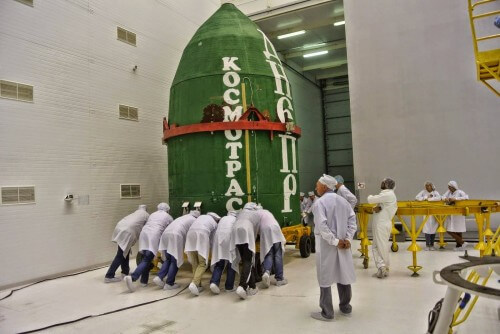Currently, about five minutes after launch, everything is fine, the tracking station in Amman has contacted the missile, and will continue to track it until the satellites are separated.

Update 22:30 The cluster containing nano satellites separated from the other satellites on the Dokifat launcher successfully separated.
Anna Heller, the teacher who headed the group that developed the satellite, also reported by phone from the launch center that the satellite had been successfully launched and was in space.
The Israeli student satellite Dokifat-1 was successfully launched together with 36 other satellites on a Russian Dnieper rocket this evening at 22:11 pm Israel time.
Two female students of the Herzliya Science Center demonstrate to the Minister of Science Yaakov Perry and the Mayor of Herzliya Moshe Padlon how the satellite is released from the platform into space, today at noon
"Dokifat 1" is a nanosatellite that is the result of research and development by high school students from the Herzliya Science Center as part of an innovative project of the Israel Space Agency at the Ministry of Science and the Municipality of Herzliya. The nanosatellite will be launched on a Russian launcher along with 37 other satellites from other countries, including a Saudi satellite.
The students were guided by a dedicated team from the specialist company, the aerospace industry and the science center.
Minister of Science, Technology and Space Jacob Perry said today at the launch event at the Science Center: "Today's launch symbolizes the beginning of the era of tiny satellites in Israel, satellites that will answer a wide range of civilian needs." The minister revealed that "the Ministry of Science is currently in talks with the Ministry of Finance regarding the next multi-year space program, with the aim of expanding the budget for a comprehensive program for space research that will also include projects of this type. The work on Dokifat 2 is already at its peak and I believe this is just the beginning of the road."
Moshe Padlon, the mayor of Herzliya, said today at the event prior to the launch, "The satellite that was launched tonight is proof of the quality of the youth and the education system in Israel and in Herzliya. I have no doubt that the tiny satellite will become great. The residents of Herzliya are proud of our student, thanks to whom we will continue to lead cutting-edge technologies in space exploration. This is just the beginning, the students are already working on further developments in the field and I intend to invest in the education system and the students of Herzliya - education is the future of all of us."
For news about the preparations for the launch and a report from the morning's events at the Science Center in Herzliya.

3 תגובות
Successfully. These students are the engineers of tomorrow. Students should be encouraged to study science and engineering. There are a little too many lawyers and business administration graduates. Nor is it certain that they are particularly successful. The investment in science and engineering studies will yield the most fruits financially.